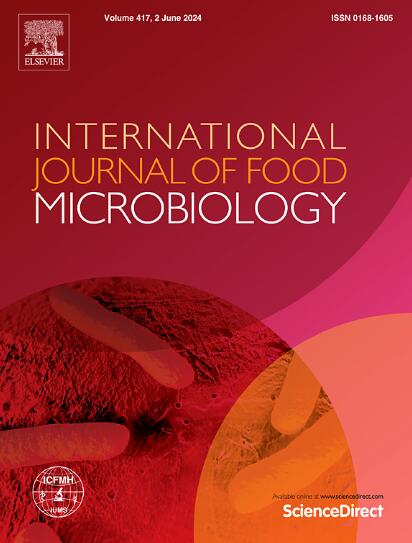橄榄绿链霉菌ZZ-21是一种潜在的防辣椒炭疽菌
IF 5
1区 农林科学
Q1 FOOD SCIENCE & TECHNOLOGY
International journal of food microbiology
Pub Date : 2025-06-11
DOI:10.1016/j.ijfoodmicro.2025.111319
引用次数: 0
摘要
炭疽病菌是一种引起炭疽病的病原菌,在辣椒果实采后造成显著的损失。利用拮抗微生物进行生物防治是可持续疾病管理的一个很有前途的解决方案。我们之前鉴定出的橄榄绿链霉菌ZZ-21具有广谱抗真菌活性。在本研究中,我们对ZZ-21在体外和辣椒果实中的特异性拮抗能力进行了研究,并探讨了其可能的拮抗机制。双重培养结果表明,菌株ZZ-21对褐霉的抑菌率为86.25%。辣椒果实试验结果表明,ZZ-21培养滤液在保持果实品质的同时,显著降低了黑曲霉引起的炭疽病发病率和病损大小。控制效果取决于ZZ-21培养滤液的浓度,在使用100%培养滤液的处理中观察到100%的控制效率。此外,ZZ-21培养滤液明显抑制了孢子萌发,破坏了scovillei的细胞膜通透性,同时通过增强防御相关酶的活性诱导植物抗性。主要抑制物质存在于ZZ-21培养滤液的蛋白质和正丁醇粗提物中,EC50值分别为56.88±0.82 μg/mL和65.37±0.36 μg/mL。利用LC-MS对这些物质进行了分析,认为这些物质与ZZ-21的广谱抗真菌活性有关。因此,菌株ZZ-21是一种防治辣椒炭疽病的有效菌剂。本文章由计算机程序翻译,如有差异,请以英文原文为准。
Streptomyces olivoreticuli ZZ-21 act as a potential biocontrol strain against pepper anthracnose caused by Colletotrichum scovillei
Colletotrichum scovillei is a pathogen that causes anthracnose, resulting in significant postharvest losses in pepper fruit. Biocontrol using antagonistic microbes is a promising solution for sustainable disease management. We previously identified Streptomyces olivoreticuli ZZ-21, which has broad-spectrum antifungal activity. In this study, we evaluated the antagonistic ability of ZZ-21 specifically against C. scovillei in both in vitro and pepper fruit assays, as well as the possible mechanisms involved. Dual culture assays revealed that strain ZZ-21 achieved 86.25 % mycelial inhibition rate against C. scovillei. Pepper fruit trials indicated that the culture filtrate of ZZ-21 significantly reduced both the incidence and lesion size of anthracnose caused by C. scovillei, while maintaining fruit quality. The efficacy of control was dependent on the concentrations of the ZZ-21 culture filtrate, with a 100 % control efficiency observed in the treatment utilizing 100 % culture filtrate. Moreover, the ZZ-21 culture filtrate obviously inhibited spore germination and damaged the cell membrane permeability of C. scovillei, while also inducing plant resistance by enhancing the activities of defense-related enzymes. The primary inhibitory substances were included in proteins and n-butyl alcohol crude extracts of the ZZ-21 culture filtrate, which exhibited EC50 values of 56.88 ± 0.82 μg/mL and 65.37 ± 0.36 μg/mL, respectively. These substances were analyzed using LC-MS and were thought to contribute to the broad-spectrum antifungal activity of ZZ-21. Hence, strain ZZ-21 is a potent biocontrol agent for controlling anthracnose in pepper caused by C. scovillei.
求助全文
通过发布文献求助,成功后即可免费获取论文全文。
去求助
来源期刊
CiteScore
10.40
自引率
5.60%
发文量
322
审稿时长
65 days
期刊介绍:
The International Journal of Food Microbiology publishes papers dealing with all aspects of food microbiology. Articles must present information that is novel, has high impact and interest, and is of high scientific quality. They should provide scientific or technological advancement in the specific field of interest of the journal and enhance its strong international reputation. Preliminary or confirmatory results as well as contributions not strictly related to food microbiology will not be considered for publication.

 求助内容:
求助内容: 应助结果提醒方式:
应助结果提醒方式:


